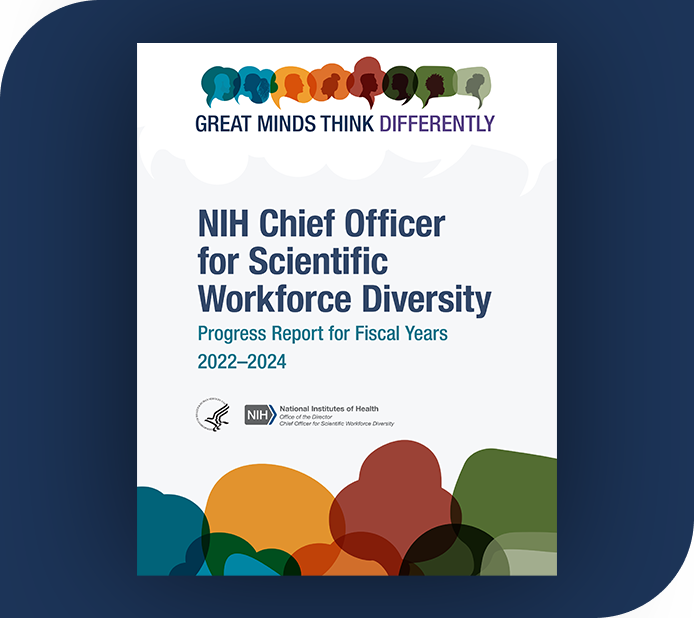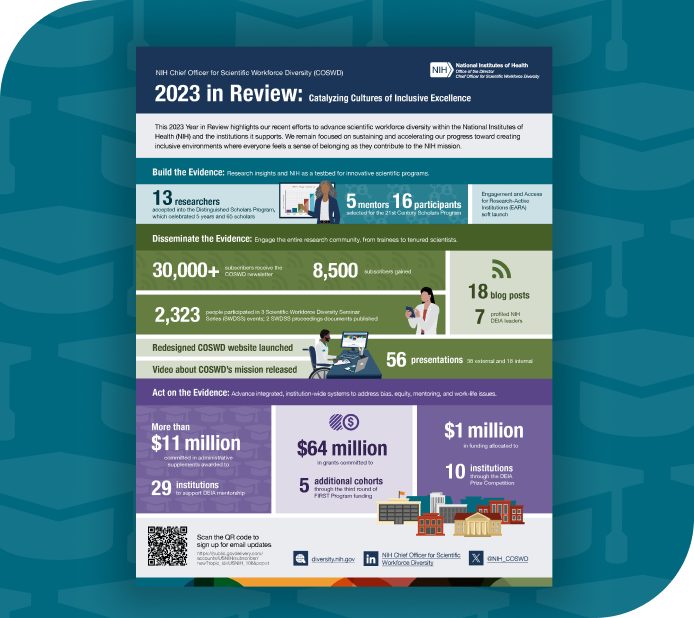Impact

Evaluating our impact is the core of the COSWD’s pursuit of evidence-based goals, informing program management and ensuring accountability. It forms the basis for determining whether to pursue an effort, how to do so effectively, and how to improve programs. We identify appropriate outcomes, metrics for assessing outcomes, and timelines on a programmatic basis, given the variation in program purposes and scope.
Publications
COSWD and our collaborative partners are often featured in scientific research publications. We have also gathered current references from our Scientific Workforce Diversity Seminar Series for scientific leaders to use in fostering creativity and innovation in science, taking advantage of a diversity of talent.
The COSWD team has helped author articles in scientific and medical publications on the importance of creating a scientific workforce that includes diverse perspectives and its benefits to both the intramural and extramural biomedical community.
Read research articlesCOSWD’s Scientific Workforce Diversity Seminar Series shares the latest research on scientific workforce diversity topics by engaging with interested professionals and researchers within the biomedical and behavioral research ecosystem. After each seminar, all the publications referenced by speakers at the event are compiled as reference materials. The list of references provides a current (as of the seminar presentation) compendium for the topic of discussion and a reference for all interested in promoting diverse perspectives in science.
View the publicationsThis report presents suggestions from the Advisory Committee to the Director (ACD) Working Group on Diversity (WGD) Subgroup on Individuals with Disabilities. It describes how NIH can support the inclusion of people with disabilities in the scientific workforce and in the research enterprise. The COSWD team convened a panel of subject matter experts to help the ACD WGD develop the suggestions contained within the report.
View the report
Previously Catalyzed Programs
COSWD works to catalyze and leverage initiatives that foster diverse perspectives in biomedical and behavioral science. As these initiatives mature, they either come to a natural conclusion or are incorporated into the portfolios of other NIH leaders. The following describes some recent examples.
The Faculty Institutional Recruitment for Sustainable Transformation (FIRST) program, funded by the NIH Common Fund, maintains cultures of inclusive excellence in the biomedical and behavioral research community. It facilitates institutions in building a self-reinforcing community of scientists, through recruitment of early-career faculty. NIH expects FIRST efforts to lead to the recruitment of talented researchers with a diversity of perspectives, to improve the quality of the training environment, to balance and broaden perspectives in setting research priorities, and to positively impact scientific discovery. The concept of FIRST originated in the COSWD office and the COSWD continues to serve on the Steering Committee for its Implementation.
The COVID-19 Impact Surveys assessed the impact of the pandemic on the research workforce and research institutions and identified the potential implications on groups underrepresented in the scientific workforce. COSWD led an NIH-wide group that developed and fielded the NIH COVID-19 Impact on Extramural Researchers Survey and the NIH COVID-19 Impact on Extramural Institutions Survey.
Reports

Progress Report: 2022-2024
Progress Report: 2022-2024
COSWD has released a midterm progress report describing milestones and achievements toward the goals outlined in our strategic plan.


